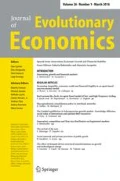Abstract
In his ‘Simple model of herd behaviour’, (Banerjee A (1992) A simple model of herd behaviour. Q J Econ CVII:797–817) shows that—in a sequential game—if the first two players have chosen the same action, player 3 and all subsequent players will ignore his/her own information and start a herd, an irreversible one. In this paper, we analyse the role played by the tie-breaking assumptions in reaching the equilibrium. We show that: players’ strategies are parameter dependent—an incorrect herd may be reversed; a correct herd is irreversible.






Similar content being viewed by others
References
Banerjee A (1992) A simple model of herd behaviour. Q J Econ CVII:797–817
Becker GS (1991) A note on restaurant pricing and other examples of social influences on price. J Polit Econ 99(5):1109–1116
Bikhchandeni S, Hirshleifer D, Welch I (1992) A theory of fads, fashion, custom and cultural change as informational cascades. J Polit Econ 100:992–1026
Fiore A, Morone A (2005) Is playing alone in the darkness sufficient to prevent informational cascades? Discussion papers on strategic interaction from Max Planck Institute of Economics, Strategic Interaction Group 2005–09
Fiore A, Morone A (2007) A simple note on informational cascades. Economics discussion papers, The Open-Access, Open-Assessment E-Journal. Discussion paper 2007-21
Hey DH, Morone A (2004) Do markets drive out lemmings—or vice versa? Economica 71(284)
Morone A (2000) To herd or not to herd, that is the question?" Economics and Complexity 2(3) Winter 1999–2000, pp. 17–30
Morone A (2007) Financial markets in the laboratory, an experimental analysis of some stylized facts. Quantitative Finance (in press)
Morone A, Samanidou E (2006) A note on herd behaviour. Working paper on Southern Europe Research in Economic Studies—DSE Bari
Author information
Authors and Affiliations
Corresponding author
Additional information
Eleni Samanidou is now with Deutsche Bundesbank. The opinions expressed in this review are those of the authors, not of the banks.
Rights and permissions
About this article
Cite this article
Morone, A., Samanidou, E. A simple note on herd behaviour. J Evol Econ 18, 639–646 (2008). https://doi.org/10.1007/s00191-007-0072-6
Published:
Issue Date:
DOI: https://doi.org/10.1007/s00191-007-0072-6



